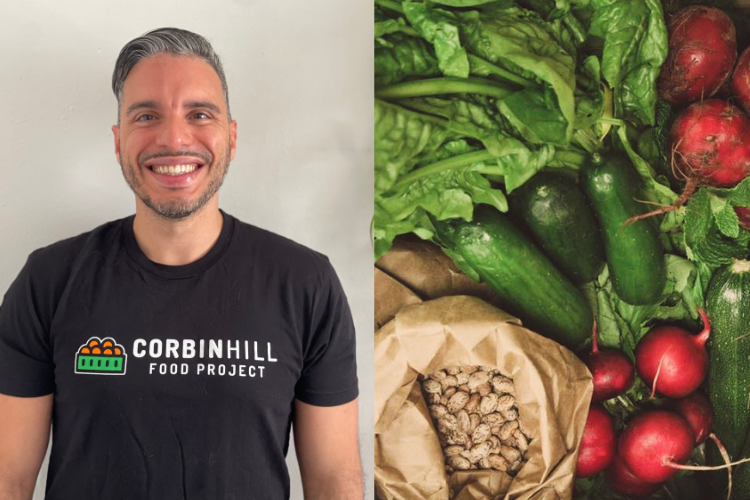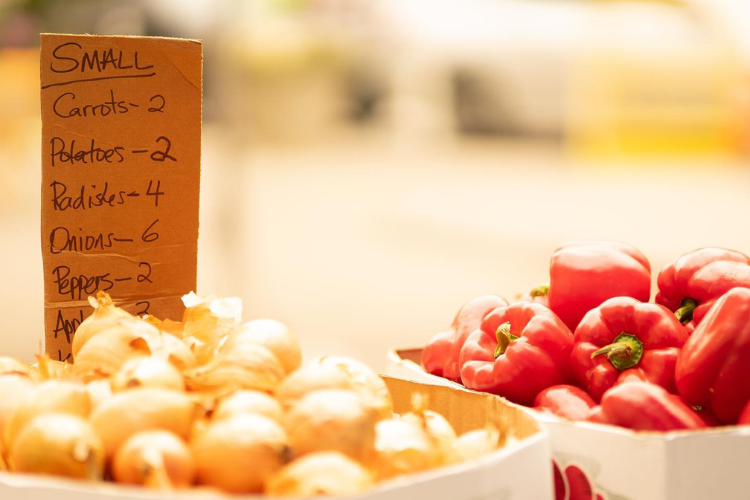Corbin Hill Food Project Volunteer Julio López Torres' Purpose is Fueled by a Vision for Food Justice
López Torres reflected on his Uptown volunteering journey and his passion for food sovereignty.

While perusing the aisles at his neighborhood grocery store Uptown, Julio López Torres couldn't help but notice the dearth of fresh produce on the shelves. For López Torres, the absence of ripe apples and leafy kale had a deeper meaning. It signified a larger issue plaguing the neighborhood: food insecurity. Seeing the parallels between social issues in his birth land of Puerto Rico and his chosen home of Harlem roused his passion and commitment to advancing food justice.
Through his volunteer work at the Corbin Hill Food Project—a Morningside Heights-based nonprofit leading initiatives centered on food access, justice, and sovereignty—López Torres is working to change the narrative by focusing on the policy side of food accessibility to ensure nutritious meal options are present in Uptown communities and beyond.
For National Volunteer Month, Columbia Neighbors spoke with López Torres about his volunteering journey, how the Corbin Hill Food Project, a past Columbia Community Service grantee, is bridging the gap when it comes to food access, and where he pulls his inspiration to serve.
What inspired you to embark on your volunteering journey?
My family migrated to the United States when I was a teenager. Growing up in Arizona, I felt a sense of detachment. There wasn't a real sense of community where I lived. I did volunteer work here and there, but it wasn’t until I moved to New York City five years ago that I saw the impact volunteering could have, particularly within BIPOC communities.
I’m from Puerto Rico, and I’ve always been aware of the social issues that were unfolding back in my country. There were concerns surrounding electricity, poverty, food insecurity, and the reliance on the United States for food sourcing. When I moved to East Harlem, I realized the parallels between what was going on in the neighborhood and what was happening back in Puerto Rico. That prompted me to get involved with local organizations. The similarities shaped my drive and motivation.
Volunteering came at a pivotal point in my journey. I used to work in tech but I lost my job during the pandemic. While trying to reassess the direction I wanted to move toward, I went back to school to get my master’s degree in environmental policy and jumped into volunteer work.
In addition to the Corbin Hill Food Project, I’m also volunteering with WE ACT for Environmental Justice and the Puerto Rican grassroots campaign, No Más Aumentos a la Luz, which is opposing additional increases to the electricity rates in the archipelago. I realized I could do a lot of good even if I’m not getting paid for it, and in the process, I can gain valuable experience.
How did you learn about the Corbin Hill Food Project? What motivated you to get involved with that organization specifically?
I learned about the Corbin Hill Food Project through my studies. I was part of the Environmental Policy and Sustainability Management master’s program at the New School. We focused on indigenous and grassroots approaches to the environmental crisis and how capitalism and systems of oppression have intensified the issue. A collection of organizations were featured in our studies, and the Corbin Hill Food Project was one of them. The nonprofit’s work resonated with me because I live in Harlem and it was based Uptown. I also became more interested in the issues of food sovereignty and food deserts.
When I moved to Harlem, it was the first time in my life that the quality of food at my local grocery stores was lacking. There was limited fresh produce and an excess amount of processed foods. Seeing this day in and day out sparked my interest in food accessibility. I wanted to get involved with the Corbin Hill Food Project because they were on the ground doing the work.
What are some of the grassroots projects you’ve worked on since joining the organization?
I wanted to do policy-focused work with small community-based organizations. With Corbin, I initially started supporting the organization with its marketing and communications efforts because those were skills I built throughout my career. Now that they’ve shifted to focus more on policy, I’m involved in those projects.
One of the most memorable projects I’ve worked on gave me the opportunity to interview one of the individuals we serve through our "Food as Medicine" program. I connected with a resident at the Randall Houses. This individual lived in a low-income community plagued by food accessibility issues. She shared how she had a lot of health issues and that access to nutritious foods within her local neighborhood was almost nonexistent. She was grateful to receive the fresh box of organic produce that she otherwise wouldn’t have been able to purchase on her own. She shared how positive and impactful the program has been for her health and how it has reshaped her outlook on food. Having the chance to speak with this person and realizing the impact an organization like Corbin Hill is having on their life has been the highlight of my time volunteering with the organization. For me, it was all about giving back and paying it forward while gaining personal growth and enrichment in the process.

What are your thoughts on the importance of food justice, especially in communities like Harlem? How is the Corbin Hill Food Project bringing solutions to the table?
Access to food should be a human right. Some of the most profitable industries are based on human necessities, like access to food, shelter, and healthcare. With food, we see the costs rising because of inflation. I believe the reason why there is such poor access to food in these neighborhoods is because this society has no regard for marginalized communities.
It’s the same thing I’m seeing in Puerto Rico, where in the last 50 years, we’ve witnessed a proliferation of fast food and junk food going into the island. As a result, people’s health has deteriorated because many companies solely see people as consumers. When you come to communities like Harlem, you have food deserts, and many people get their food from bodegas. Access to healthy food is crucial for these communities. The work Corbin Hill Food Project is doing is essential for the well-being of people living in neighborhoods like Harlem.
The work Corbin Hill Food Project is doing is essential for the well-being of people living in neighborhoods like Harlem.
The Corbin Hill Food Project is also trying to create an ecosystem that connects BIPOC farmers in the Northeast with communities of color in the city. Not only will this provide people in New York City access to good food, but it will also develop opportunities for farmers who have been historically excluded from the market.
At the end of the day, we produce enough food to feed everybody, but the distribution is not equitable. Organizations like this are essential in changing the narrative and reshaping our relationship with food, particularly when you’re focusing on sourcing food locally or within your region as opposed to bringing it from somewhere where the food is being produced at the expense of local people and has been the cause of so much violence and dispossession.
What is your definition of a volunteer?
A volunteer is somebody who is invested in and cares about the work they’re doing. It’s something you’re doing out of the kindness of your heart without the expectation of receiving anything in return. Sometimes we’re told personal gain and growth comes from making more money and materialistic things, but for me, volunteer work is more meaningful and important to society as a whole than any type of work I’ve done for any company I’ve worked for. It brings me personal gratification that the work I’m doing is impactful.
Who or what are you inspired by?
I’m inspired by people doing work around food justice and food sovereignty. I’m inspired by the small community organizers and farmers who are carrying the message. I’m inspired by indigenous communities that have been opposing capitalistic extraction and dispossession for many years. In society, people often fall into this belief that one person is going to make a difference. In reality, the people who are going to save the communities are the people who are there. The people who know what they need, the people who have been doing the work. Not just some person who got inspired at the last minute and they have the privilege and the money to go and do something. I think it’s more collective than anything.
Following in the footsteps of these changemakers, I want to continue growing personally and ingraining myself in the Uptown community even more. I want to do more community-oriented work in climate and food justice since they're interrelated. I want to contribute to building more equitable and fair systems across the board.
The people who are going to save the communities are the ones who are there; the people who know what they need and the people who have been doing the work.
What are your favorite places Uptown?
When I grew up in Arizona, I felt a sense of detachment from my culture—which was very difficult for me—so it’s refreshing to be immersed in my Puerto Rican roots Uptown through the different small businesses and the wider community. I love that aspect. One of my favorite food spots is the Puerto Rican woman-owned El Cocotazo, located inside La Marqueta in East Harlem, under the train tracks on 115th and Park. Their food is probably some of the best Puerto Rican food in the city.
I also like going to Riverside Park for a walk along the water. It’s a good way to get away from the busyness of the city. I also really like Sugar Hill Creamery. I love this neighborhood and being a part of it. It makes me feel at home and comfortable in this country for the first time since I moved here.